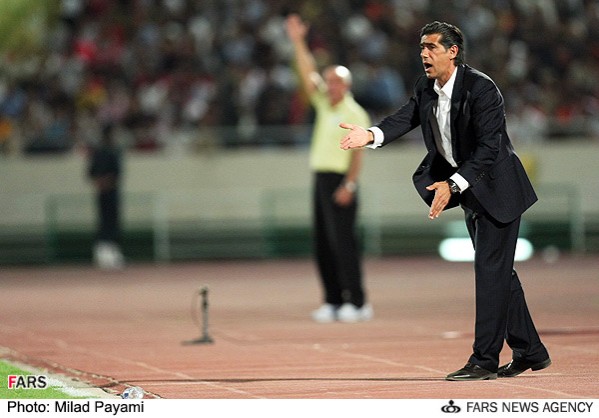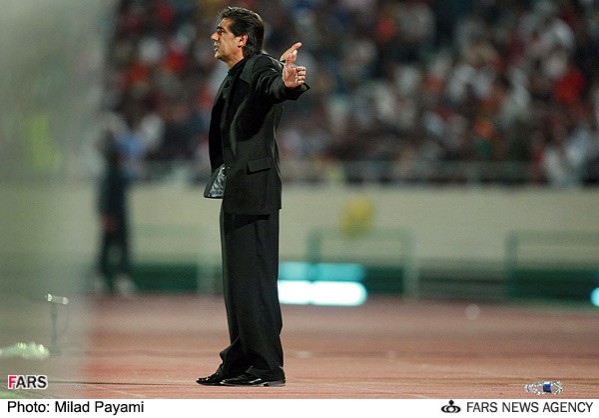|

GOAL - Believing in yourself and your ability
is step one of road to success. In football, best clubs around the world are
led by coaches that inject the positive thinking and the desire for
championships to their players.
Since the triumph of Blackburn Rovers in 1995, Manchester United, Chelsea
and Arsenal have won all Premier League titles. These three clubs have
enjoyed coaching leaderships that are unusual yet they have an absolute
belief in theirselves and a winning desire. As every season begins, Sir Alex
Ferguson, Jose Mourinho ( who resigned last week) and Arsène Wenger start by
talking about winning the league. They set the standards high.
In Iran it is uncommon to hear club coaches talk about winning the league.
Even at the national team level, we are used to hearing coaches talking down
Iran’s chances for any tournament as they constantly look for excuses. It
feels like that every national team head coaches needs to start every press
conference and interview by stating a whole list of problems to justify poor
results or poor play.
Over the past couple of years, Luka Bonacic (Sepahan’s head coach) and Ali
Daei (Saipa’s head coach) have been the exceptions. While these two coaches
should be recognized for their positive thinking, it is true that their
clubs don’t have the national following and constant scrutiny that the
national team as well as Esteghlal and Perspolis have to face.
The arrival of Afshin Ghotbi has been like a refreshing breeze that has
floated into Iran’s club coaching community. Trained under several of the
great Dutch coaches of our time, Ghotbi understands the power of the mind
and mindset for the players, coaching staff, club administrators, fans and
the media.
From the time he arrived in Iran, Ghotbi took the strong position that his
team “shall win the championship.” His position was not that “we have a good
chance” or “if all goes well, we would be there.” There was no hedging, no
mixed messages and no confusion in what his stated goal was from day one.
“We are here to win and we will.”
Ghotbi’s claim did more than setting the expectations high for himself and
the club. He managed to focus the attention of all on “Perspolis the
Champion to be” vs. “Perspolis the team with many financial and internal
problems.”
Overnight, the media began discussing if Ghotbi’s claim was valid and with
each Perspolis’ victory the discussion turned into which team could slow
down the Red juggernaut. Ghotbi has been demonstrating that a very good
coach needs to prove his value not just during the 90 minute of a match or
preparations leading to the game.
A winning coach should inject the power of positive thinking, desire to win
and striving for excellence. Naturally, as millions of fans and scores of
media have gravitated toward Ghotbi and Perspolis, the “naysayers” whom see
their future existence as coaches in danger began a strong negative campaign
to shoot Ghotbi down.
For them, success of Ghotbi, Bonacic and Daei means that future coaches
should be familiar with the international game and professional football.
These snipers need Perspolis to lose and Sepahan to get eliminated from the
Asian Championships League (ACL) and for Daei to fail in his attempt to
defend Saipa’s championship.

The success of these three coaches would
gurantee an end of era for certain Iranian coaches. Six weeks into the
season, Perspolis has registered four wins and two ties and is sitting at
the top of the table. By all accounts, Perspolis has displayed the most
entertaining football of all clubs and Ghotbi has established himself as the
leader of Iran’s most popular team.
Bonacic’s Sepahan is one point behind with a game in hand in third place and
has a shot to advance to ACL’s semifinals. Daei’s Saipa has erased the poor
outings of the first two weeks of this season and with an impressive win
against Esteghlal re-established Saipa as a contender.
Going back to Ghotbi, he had to maneuver around another real sensitive
topic. Perspolis’ roster was put together by Hamid Estili. Estili, the
national team player who scored Iran’s first goal against USA in the 1998
World Cup joined the coaching ranks two years ago. He wanted Perspolis’ head
coaching job and ironically he was the one who contributed significantly to
the departure of famed Turkish head coach Mostafa Denizli’s last year and
recruiting of Ghotbi this year.
From the perspective of the media and the fans, Estili and Ghotbi certainly
“must” not get along. Yet, Ghotbi has managed to keep Estili on his side by
complimenting him repeatedly and recognizing the good work that Estili did
during the off season for drafting in players.
In my recent conversation with Afshin Ghotbi, he said that “each of us has a
different role. We work as a team and will succeed as a team.” In Ghotbi’s
view, even if there are concerns about Estili, he does not show it. Ghotbi
recognizes that it is more important is to focus on the synergy this
partnership can and should bring to become champions.
As a club, Perspolis has been lucky to have three very good coaches in her
recent history. Dutch man Arie Haan began to change Perspolis’ style. Last
year, Denizli established entertaining football and despite finishing the
season strong with a ten game unbeaten streak, came just short of finishing
at the top.
Ghotbi, fresh out of a time spent with the South Korea national team has
taken the positive and winning attitude to a new level and six weeks into
the season, he has managed to put the focus on his team’s chances for
championship vs. all the usual side issues that brew around the Reds and
Blues club.
Ghotbi’s success at Perspolis, Bonacic at Sepahan and Daei at Saipa provide
positive reinforcement for Iranian football. They are pioneers of a new era
among coaches in Iran. Ghotbi by choice and course of events now carries the
“flag for change” in Iran’s football.
Iran’s football has seen nothing but disappointments at all levels over the
last three years. Iran’s football needs Ghotbi’s team to win more than
Ghotbi himself does. Iran’s football needs major attitude adjustment and
Ghotbi is doing just that.
Kaveh Mahjoob
This email address is being protected from spambots. You need JavaScript enabled to view it.
|


